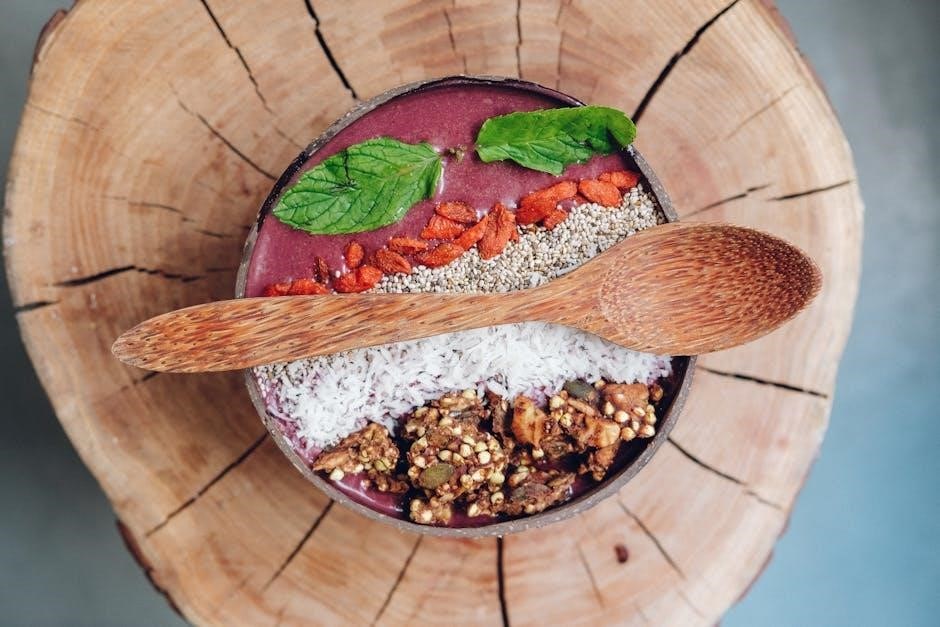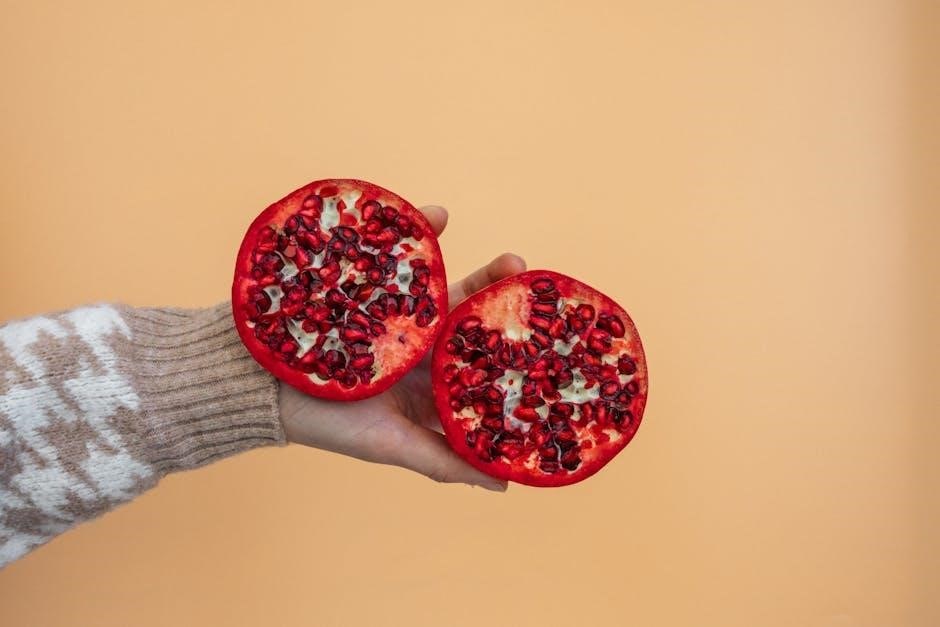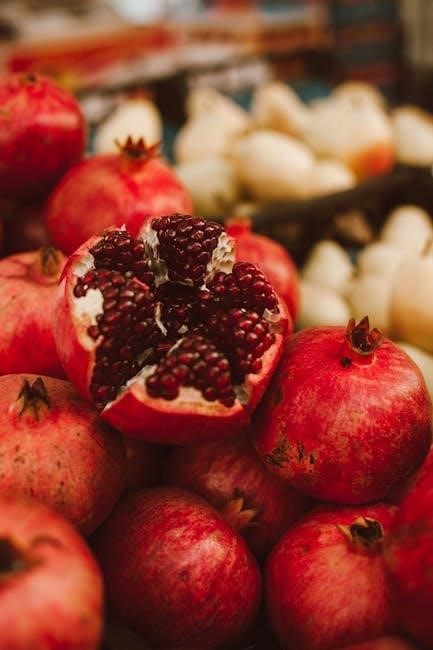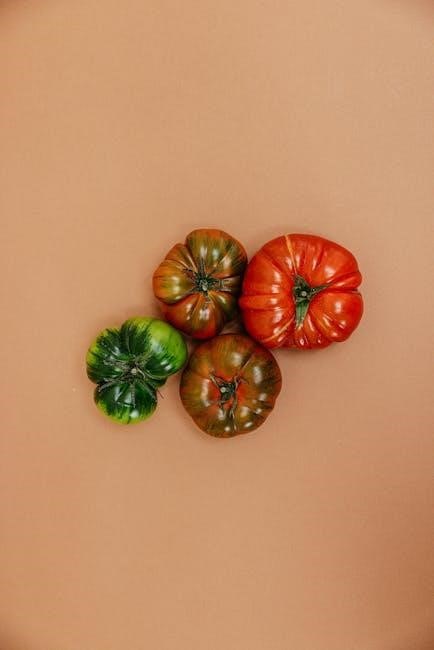Plant-based foods form the foundation of a healthy diet, including vegetables, fruits, whole grains, beans, legumes, nuts, seeds, and healthy fats like avocados, excluding animal products.
What is a Plant-Based Diet?
A plant-based diet focuses on consuming foods derived from plants, such as fruits, vegetables, whole grains, beans, nuts, and seeds, while minimizing or excluding animal products. It emphasizes whole, minimally processed foods to ensure optimal nutrition. Protein sources include legumes, tofu, and edamame, while healthy fats come from avocados, olives, nuts, and seeds. The diet promotes sustainability and health by prioritizing natural ingredients and diverse flavors through fresh herbs and spices. It offers flexibility, allowing some to include small amounts of animal products, but primarily highlights plant-based options for a balanced and nutritious lifestyle.
Benefits of a Plant-Based Diet
A plant-based diet offers numerous health benefits, including reduced risks of chronic diseases like heart disease and diabetes. It supports weight management and improves gut health through high fiber intake. Plant-based eating is environmentally sustainable, reducing greenhouse gas emissions and water usage. It encourages a balanced intake of essential nutrients and antioxidants, while lowering cholesterol levels. Additionally, it can be cost-effective, focusing on whole, minimally processed foods. Overall, it promotes long-term well-being and sustainability for both individuals and the planet.

Vegetables
Vegetables are a cornerstone of plant-based eating, offering essential vitamins and minerals. Common choices include spinach, broccoli, carrots, and tomatoes, while options like zucchini and asparagus add variety and nutrients, enriching meals with vibrant colors and flavors, and providing a natural source of energy and health benefits.
Common Vegetables in Plant-Based Diets
Common vegetables in plant-based diets include spinach, broccoli, carrots, zucchini, asparagus, and tomatoes. These are rich in vitamins and minerals, providing vibrant colors and flavors to meals. They are versatile and can be prepared in various ways, making them a natural source of energy and health benefits, while offering a variety of textures and tastes that enhance plant-based cuisine, making them a nutritious and essential part of daily meals.
Less Common but Nutritious Vegetables
Less common but nutritious vegetables include artichokes, arugula, and sprouts like bean and cabbage. These are packed with unique nutrients and flavors, adding variety to meals. Arugula offers a peppery taste, while artichokes provide fiber and antioxidants. Sprouts are rich in enzymes and vitamins, making them a healthy choice. Incorporating these into plant-based diets can enhance nutritional diversity and provide exciting flavors, while supporting overall health and well-being with their distinct benefits and versatility in recipes.

Fruits
Fruits are vibrant, nutrient-rich additions to plant-based diets, offering essential vitamins, minerals, and antioxidants. They include popular choices like bananas, apples, and berries, as well as exotic varieties such as starfruit and tangerines, providing natural sweetness and versatility in meals, supporting overall health and well-being with their diverse flavors and nutritional benefits.
Popular Fruits for a Plant-Based Diet
Popular fruits in a plant-based diet include bananas, apples, pears, and berries like strawberries, blackberries, blueberries, and raspberries. These fruits are rich in vitamins, minerals, and antioxidants, providing natural sweetness and versatility in meals. Watermelon, with its high water content, is also a refreshing choice. Incorporating these fruits into daily meals supports overall health and well-being, offering essential nutrients and fiber while enhancing flavor and variety in plant-based cuisine.
Exotic and Seasonal Fruits
Exotic fruits like starfruit, tangerines, and kiwi add unique flavors and nutrients to plant-based diets. Seasonal fruits, such as pomegranates in fall or winter citrus, provide variety and freshness. Incorporating these fruits supports a diverse and vibrant diet, ensuring a wide range of vitamins and minerals while keeping meals exciting and nutrient-rich throughout the year.

Whole Grains
Exotic fruits like starfruit, tangerines, and kiwi add unique flavors and nutrients to plant-based diets. Seasonal fruits, such as pomegranates in fall or winter citrus, provide variety and freshness. Incorporating these fruits supports a diverse and vibrant diet, ensuring a wide range of vitamins and minerals while keeping meals exciting and nutrient-rich throughout the year.
Types of Whole Grains
Whole grains are a staple in plant-based diets, offering essential nutrients like fiber, vitamins, and minerals. Common types include oats, quinoa, brown rice, barley, rye, and bulgur. These grains are minimally processed, retaining their nutritional value. They provide sustained energy and support digestive health. Incorporating a variety of whole grains ensures a balanced diet, while their versatility makes them suitable for salads, side dishes, and main courses, enhancing both nutrition and flavor in plant-based meals.
Gluten-Free Grain Options
Gluten-free grains are ideal for those with dietary restrictions, offering variety in plant-based diets. Options include brown rice, quinoa, millet, sorghum, teff, and amaranth. These grains are rich in fiber, vitamins, and minerals, providing sustained energy and nutritional balance. Quinoa, a complete protein, is particularly beneficial, while millet and teff are excellent sources of iron and calcium. These grains are versatile, suitable for salads, sides, or as bases for meals, ensuring a gluten-free, nutrient-rich diet.

Protein Sources
Plant-based protein sources include beans, legumes, lentils, tofu, tempeh, edamame, and nuts. These options are rich in essential nutrients, supporting muscle health and energy levels effectively.
Beans and Legumes
Beans and legumes are versatile protein-rich staples in plant-based diets. Common varieties include black beans, lentils, chickpeas, kidney beans, and split peas. They are also rich in fiber, vitamins, and minerals, making them a nutritious choice for soups, salads, and main dishes. Incorporating beans and legumes ensures a balanced intake of essential nutrients while supporting overall health and well-being in a plant-based lifestyle.
Tofu, Tempeh, and Edamame
Tofu, tempeh, and edamame are excellent plant-based protein sources derived from soybeans. Tofu is versatile and can be used in stir-fries, curries, and salads, while tempeh offers a nutty flavor and probiotic benefits. Edamame, or boiled soybeans, is high in protein and fiber. These foods are rich in essential nutrients like iron, calcium, and vitamins, making them ideal for a balanced plant-based diet. They are also low in calories and saturated fats, promoting overall health and well-being.

Nuts and Seeds
Nuts and seeds are rich sources of healthy fats, protein, and fiber, ideal for snacks or adding crunch to plant-based meals, supporting overall nutrition and well-being.
Types of Nuts
Nuts are a versatile and nutritious addition to plant-based diets, offering healthy fats and protein. Common varieties include almonds, walnuts, cashews, hazelnuts, pistachios, and Brazil nuts. Pecans, macadamia nuts, and pine nuts are also popular choices. Each type provides unique flavors and textures, making them ideal for snacking, baking, or adding crunch to meals. Nuts are also a great source of essential nutrients like magnesium, zinc, and vitamin E, supporting overall health and well-being in a plant-based lifestyle.
Types of Seeds
Seeds are a nutritious and versatile part of plant-based diets, offering healthy fats, protein, and fiber. Common types include chia, flax, sunflower, pumpkin, sesame, and hemp seeds. Chia and flax seeds are rich in omega-3 fatty acids, while sunflower and pumpkin seeds provide magnesium and zinc. Sesame seeds add a nutty flavor, and hemp seeds are a complete protein source. Incorporating seeds into meals enhances nutrition and texture, making them a valuable addition to a plant-based lifestyle.

Healthy Fats
Healthy fats are essential for a balanced diet, sourced from avocados, olives, nuts, seeds, and whole plant-based foods, providing energy and supporting overall health and nutrition.
Avocados and Olives
Avocados and olives are rich sources of healthy fats, essential for a balanced plant-based diet. Avocados provide creamy texture and nutrients like vitamin C and potassium, while olives offer antioxidants and a savory flavor. Both are versatile in recipes, from salads to sauces, and support heart health and energy levels naturally. Incorporating them into meals enhances nutrition and satisfaction, making them a key component of whole, plant-based eating patterns.
Nuts and Seeds as Sources of Healthy Fats
Nuts and seeds are excellent sources of healthy fats, proteins, and fiber. Almonds, walnuts, chia seeds, and flaxseeds offer omega-3s, while sunflower and pumpkin seeds provide vitamin E. They support heart health and digestion, making them ideal snacks or additions to meals. Incorporating a variety ensures a balanced intake of essential nutrients, enhancing overall well-being in a plant-based diet.

Fresh Herbs and Spices
Fresh herbs like basil and cilantro add vibrant flavors, while spices such as turmeric and cinnamon offer both taste and health benefits, enhancing plant-based dishes naturally.
Common Fresh Herbs
Popular fresh herbs include basil, cilantro, parsley, dill, and mint. These herbs add vibrant flavors to plant-based dishes, enhancing salads, soups, and vegetable preparations. They also provide essential nutrients and antioxidants, supporting overall health. Fresh herbs like chives and oregano are versatile, while others like rosemary and thyme complement roasted vegetables and legumes. Incorporating these into meals ensures a burst of fresh flavor without added fats or salts, making them a healthy choice for any plant-based diet. Basil, in particular, pairs well with tomatoes and avocados, creating delicious and nutritious combinations. Herbs not only elevate the taste but also contribute to a balanced and satisfying meal. Using fresh herbs can inspire creativity in the kitchen, making plant-based cooking both enjoyable and diverse. They offer a natural way to season dishes, avoiding the need for artificial flavorings. With so many options available, fresh herbs are a cornerstone of a flavorful plant-based lifestyle.
Dried Spices for Flavor
Dried spices like turmeric, cumin, paprika, and chili powder add depth to plant-based dishes. They enhance flavors without added fat, making meals vibrant and aromatic. Black pepper, cayenne, and cinnamon are staples, while options like allspice and caraway seed offer unique twists. These spices are versatile, complementing legumes, grains, and roasted vegetables. Incorporating them ensures meals are flavorful and nutritious, supporting a diverse and satisfying plant-based diet. Dried spices are a key component of creative and delicious cooking, offering endless possibilities for seasoning without compromise. They are essential for adding warmth and complexity to various dishes, making plant-based cuisine both exciting and varied. With a well-stocked spice rack, every meal can be transformed, ensuring a rich and satisfying flavor profile. Dried spices are a must-have for anyone exploring plant-based cooking, providing a natural way to elevate dishes effortlessly. They are a testament to the diversity and richness of plant-based flavors, offering something for every palate. Using dried spices allows for experimentation and creativity, making every meal a new adventure in taste and nutrition.

Meal Planning and Grocery Lists
Plan meals around whole grains, beans, and vegetables, and organize grocery lists to include leafy greens, fruits, nuts, seeds, and spices for balanced nutrition and efficiency.
Creating a Plant-Based Grocery List
A well-organized plant-based grocery list includes fresh vegetables, leafy greens, fruits, whole grains, beans, legumes, nuts, seeds, avocados, and spices. Canned items like beans, tomatoes, and artichoke hearts are also essential for convenience; Fresh herbs and dried spices add flavor to meals. Incorporate healthy fats like olives and nuts for balanced nutrition. Ensure variety by including seasonal and exotic fruits, and don’t forget staples like lentils and tofu for protein-rich meals.
Weekly Meal Planning Tips
Plan balanced meals by rotating protein sources like beans, lentils, and tofu. Incorporate a variety of colorful vegetables and seasonal fruits to ensure nutrient diversity. Use canned goods for convenience, such as beans, tomatoes, and artichoke hearts. Swap meat with plant-based options like veggie burgers or mushrooms. Prepare salads, soups, and stir-fries in advance for quick meals. Mix grains like brown rice, quinoa, and oats for texture and variety. Add fresh herbs and spices to enhance flavor without extra calories.
Adopting a plant-based diet offers numerous health benefits, emphasizing whole foods like vegetables, fruits, grains, beans, and nuts. It promotes sustainability and overall well-being effectively.
Final Thoughts on Plant-Based Foods
Plant-based foods offer a diverse and nutritious foundation for a healthy lifestyle. Emphasizing whole, minimally processed ingredients like vegetables, fruits, grains, and legumes ensures optimal nutrition. Incorporating nuts, seeds, and healthy fats like avocados enhances flavor and provides essential nutrients. A well-planned plant-based diet not only supports personal health but also promotes environmental sustainability. For those exploring this path, resources like a plant-based foods PDF list can serve as a valuable guide to stocking your pantry and creating balanced meals.
Resources for Further Exploration
For those interested in exploring plant-based foods further, numerous resources are available. Websites like EatPlant-Based.com offer downloadable PDF guides, including detailed grocery lists and meal plans. These resources highlight a variety of whole, minimally processed foods such as vegetables, grains, legumes, and healthy fats. Additional materials include high-protein food lists, seasonal fruit guides, and spice charts. These tools provide a comprehensive starting point for anyone looking to adopt or expand a plant-based lifestyle.